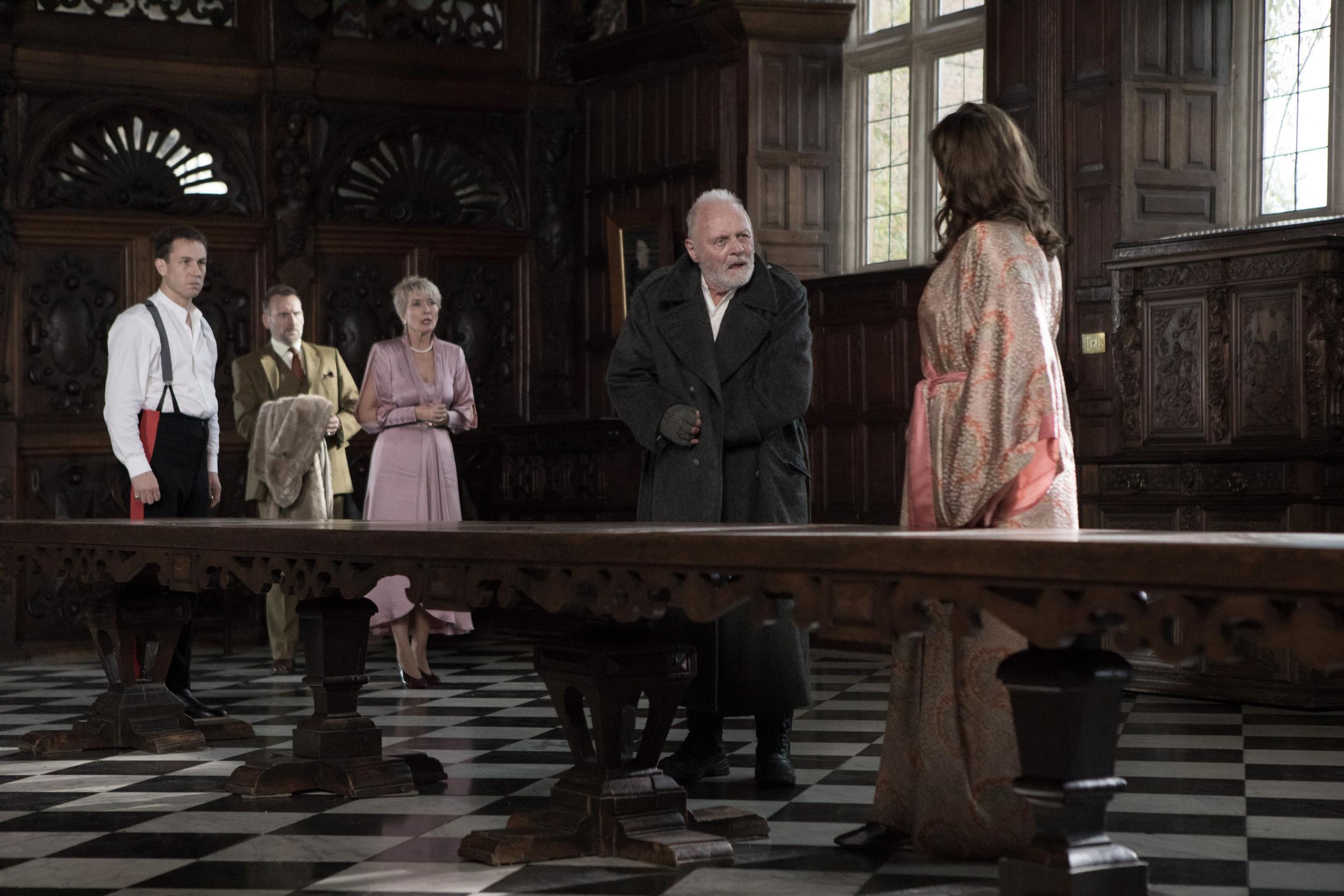King Lear review: Anthony Hopkins stars in a murky adaptation
Richard Eyre's two-hour filming of Shakespeare tragedy boasts an astonishing cast – but the storytelling can feel choppy

The big advantage, traditionally, of filmed Shakespeare is intimacy: with no need to project, your Iago can whisper, your Hamlet can murmur. But this starrily-cast, modern day version by Richard Eyre for the BBC and Amazon rarely takes advantage of this.
There’s a whole lot of shouting from the off, especially by Anthony Hopkins’ Lear – although by the final scenes he achieves a more subtle tenderness with Florence Pugh’s Cordelia. The suggestion that he’s a spoilt man-child also comes out in moments of menacing gleefulness, that recall the capering of his superb Titus Andronicus in the Julie Taymor film.
But while it feels like this might be something that’d actually work on the Olivier stage at the National theatre, it’s not always quite clear why it’s on the box. Neither a bracingly clarified ‘traditional’ take a la the best bits of the BBC’s The Hollow Crown (which Eyre also directed in part) nor a stylish, stylised modern reworking, this King Lear falls between two stools.
The other thing that isn’t always clear is, well, the plot. It runs at a brisk two-hours, but that leaves the fiendishly complicated (and at times, pretty implausible) political and emotional machinations just whizzing past you like so many bullets.

That cast, though. Emma Thompson and Emily Watson are terrific as Lear’s daughters, Goneril and Regan. Jim Broadbent is a heartfelt Gloucester, Andrew Scott mercurial as his son Edgar. Tobias Menzies, Christopher Eccleston, Jim Carter are all on point. There’s real detail in individual moments from almost everyone – but the big picture is often a mess. Too often characters’ arcs feel chopped up and scatter-shot.
Scott, for instance is utterly magnetic when it’s just him, Shakespeare, and a camera – as his recent Hamlet proved, he has an almost uncanny brilliance at suggesting that a spontaneous thought is prompting his speech, not verse written over 400 years ago. It’s simultaneously low-key and super-charged. But his Edgar seems to skip from nervy nerd to near madness to feigned madness to steely reason, without much sense of a through-line or character development; it’s just scenes, scenes, scenes.
What is most fresh but coherent is Eyre’s interpretation of the three sisters as women absolutely at the end of their tether. Regan and Goneril are not mere evil harpies, nor is Cordelia a sweet saint. When she refuses to flatter her father, it seems less because she’s pure, and more because she’s had it up to here with the demanding, petulant, selfish old sod. She’s all side-eye at his demands, eyebrow-cocking at her sisters’ phoniness.
This is no sudden descent by Lear – when Regan and Goneril discuss his hot-tempered decision to cut Cordelia off, the conclusion is this is typical of their bluff yet babied father: “he hath ever but slenderly known himself”, observes Regan, with emphasis.
The sisters have to put up with much raging, and even psychical oppression, from this patriarch (Eyre even includes a dubiously underdeveloped moment when Lear forces a kiss on Goneril). And they also end up mired in other men’s power-grabs: Gloucester’s eye-gouging is achieved by Regan’s husband guiding her manicured nail into the old man’s eye. You wouldn’t call it a feminist rewrite by any means, but it does save Goneril and Regan from simple ugly sister territory.
Elsewhere, it can be a murky adaptation. Quite literally – the film becomes increasingly de-saturated till it’s almost black and white. Or really, a smudgey, dull grey. The modern setting sees bombs going off in bus stops, a surprisingly striking way of bringing the violence into both the present tense and close to home. A tramp-like Lear pushes a shopping trolley full of rubbish around a bleak city centre, just another dispossessed muttering madman. Much action being in Dover, the refugee crisis is smartly nodded to, with a grim storm scene in a camp of makeshift tents.
If any tourist boards were hoping that a handsome prestige Shakespeare full of English thesps might do their job for them by being shown on Amazon in the US, they best think again: this is the greyest, grimmest, most rainy and miserable view of England. And while there are some imperious performances and superb moments of interpretation, overall the programme also feels pretty untempting for viewers new to Shakespeare.
Join our commenting forum
Join thought-provoking conversations, follow other Independent readers and see their replies
Comments
Bookmark popover
Removed from bookmarks